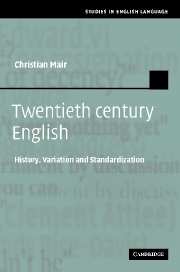Book contents
- Frontmatter
- Contents
- List of figures
- List of tables
- Acknowledgments
- 1 Setting the scene
- 2 Ongoing language change: problems of detection and verification
- 3 Lexical change in twentieth-century English
- 4 Grammatical changes in twentieth-century English
- 5 Pronunciation
- 6 Language change in context: changing communicative and discourse norms in twentieth-century English
- Conclusion
- Appendix 1 Brief survey of the corpora used for the present study
- Appendix 2 The OED Baseline Corpora
- Appendix 3 Estimating text size in the newspaper archives and the World Wide Web
- Appendix 4 A quarterly update of the OED Online (New Edition) – 13 March 2003: Motswana to mussy
- References
- Index
1 - Setting the scene
Published online by Cambridge University Press: 22 September 2009
- Frontmatter
- Contents
- List of figures
- List of tables
- Acknowledgments
- 1 Setting the scene
- 2 Ongoing language change: problems of detection and verification
- 3 Lexical change in twentieth-century English
- 4 Grammatical changes in twentieth-century English
- 5 Pronunciation
- 6 Language change in context: changing communicative and discourse norms in twentieth-century English
- Conclusion
- Appendix 1 Brief survey of the corpora used for the present study
- Appendix 2 The OED Baseline Corpora
- Appendix 3 Estimating text size in the newspaper archives and the World Wide Web
- Appendix 4 A quarterly update of the OED Online (New Edition) – 13 March 2003: Motswana to mussy
- References
- Index
Summary
… ask yourself whether our language is complete; – whether it was so before the symbolism of chemistry and the notation of the infinitesimal calculus were incorporated in it; for these are, so to speak, suburbs of our language. (And how many houses or streets does it take before a town begins to be a town?) Our language can be seen as an ancient city: a maze of little streets and squares, of old and new houses, and of houses with additions from various periods; and this surrounded by a multitude of new boroughs with straight regular streets and uniform houses.
(Ludwig Wittgenstein, Philosophische Untersuchungen/Philosophical investigations, translated by G. E. M. Anscombe. Oxford: Blackwell, 1967: 18)Anyone proposing to write a history of the English language in the twentieth century begs a number of questions, which it is necessary to answer at the very outset of what might seem an excessively ambitious project.
Isn't the topic too vast and complex for a single author to tackle? If one bears in mind that in contrast to historians of Old and Middle English, who in general suffer from a poverty of evidence, the historian of recent and contemporary English is deluged with data and, in principle, needs to write separate histories of several richly documented standard and nonstandard varieties, and a history of contact and influence among them, the answer to this question is an obvious “yes.”
- Type
- Chapter
- Information
- Twentieth-Century EnglishHistory, Variation and Standardization, pp. 1 - 11Publisher: Cambridge University PressPrint publication year: 2006



